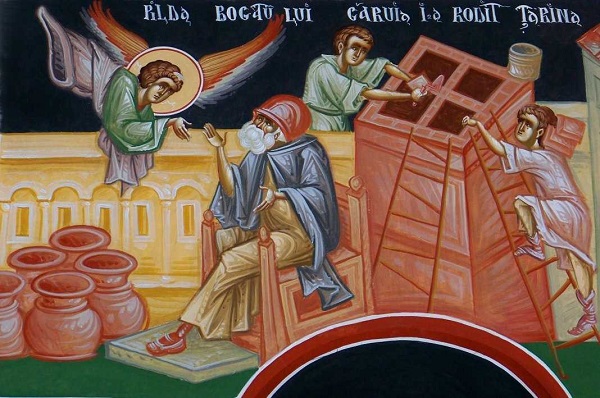9th Sunday of Luke: ‘A Fierce Condemnation of Greed’
20 November 2022The ninth Sunday of Luke, and the subject matter of the Gospel reading is again related to the great temptation of the misguided use of wealth. The parable of the foolish rich man is well known but at the same time pertinent to everyone, not only to those who have a lot of money.
The man mentioned in today’s Gospel was so rich that he didn’t have enough room to store his wealth and his goods. It would seem that the only thing he cared about in life was how to accumulate as many goods as possible. He was the type of person who, instead of loving the beauty of life, was instead enamored totally and completely with material things and an abundance of goods. The unfortunate man was under the false impression that by accumulating wealth he was also gaining happiness.

In fact, this concern of his amounted to a sickness. In other words, it was an obsessive state of mind, in which, instead of working in order to live in a dignified manner, he lived in order to work and make profits. It’s not just that the man in the Gospel was rich; he was totally dedicated to and taken up with how to become even richer. You might say he was Wealth personified in a man whose sole concern was money and worldly goods.
The point in question is the extent to which this reasoning appeals to people today. How far is wealth the aim? As can readily be understood, the Gospel refers to riches so often not in order to condemn them per se but rather the misuse of them. According to the rationale of the Gospel being rich is a great trial. If your wealth is a cause of joy for your neighbor, then you can call yourself rich in Christ. But if your wealth is yours to enjoy and yours alone, so that you can eat and have fun selfishly, then, as far as the Gospel’s concerned you’re simply avaricious.
Greed and avarice are strong passions. In monasticism, one of the three life-long promises is to own nothing. That is, the rejection of and disengagement from all worldly possessions so that possession of heaven might be attainable. In the secular world, this is achieved by developing a healthy relationship with material goods and money. Our aim shouldn’t be to lay up treasures on earth and become rich, but rather how we are to ensure we have the necessities for life here. And it’s a fact that we can live in a dignified manner with very few, simple things. What makes it difficult to appreciate this truth is the manic consumerism of today’s culture which, instead of simplifying our life, makes it that much more complicated.
The outlook of the foolish rich man is one that endures to this day, since wealth and an abundance of goods become the sole purpose in life. We’ll all experience this in a short while from now, as we approach Christmas. The only thing the secular world has to offer is the consumerism of Christmas: the food, the gifts, the glittering ornaments and whatever else of secondary importance that adorns the feast of the birth of the Son of God as a human person. So, while, as genuine Christians, we should celebrate the event mystically and simply, our bad habits demand that we do so like the foolish rich man, that is with excess. The Gospel condemns excess as an attitude and way of life and proposes instead the virtue of simplicity and measured restraint, so that we might experience God’s riches.






